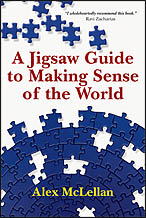
“The challenge [to seeing the big picture and living in light of the truth] is that every religion claims to grant such heavenly insight, and many peer groups will pull together to defend what is common sense at least to them. They may even point to a few pieces of the puzzle that seem to go together and support their view. A small sample of life can give you a glimpse of the big picture but it can also distort it, and when someone has drifted off course we need to try to steer them back in the right direction. Raising questions and reflecting on critical issues encourages people to stand back and take stock, and we can share the reasons we believe our worldview fills in critical gaps and captures the big picture better than anything else. Our goal is to arrive at the ‘Eureka!’ moment when someone starts to make sense of the world. But a number of obstacles stand in the way.” — Alex McLellan. A Jigsaw Guide to Making Sense of the World. Downers Grove, IL: InterVarsity Press, 2013, 25.
Discussion question from the end of Chapter 1: “A jigsaw strategy encourages you to think big by starting small. Where would you start when it comes to helping someone make sense of the world?” (53)
In agreement with McLellan, I start by trying to ask good questions, to practice the art of listening, and to answer questions asked of me with clarity/openness. A significant part of making sense of the world involves articulating not only how one understands/interacts with the world, but also how one understands/interacts with one’s very person/being. It’s hard to point a person in a new direction when one doesn’t know the direction one’s conversant is headed (i.e., upon what road they’re traveling), even harder when one’s conversant lacks a sense of direction (i.e., most probably just soaking in larger cultural perspective as “common sense”), and hardest when one doesn’t know one’s own perspective.
As much as possible I locate such conversations as part of a larger community of truth* (Scripture, reason, the Body of Christ; materials such as articles, blog posts, books, campus/community/church speakers, etc.) and as such I regularly gain insights regarding how I “miss the mark” and/or even need to reaffirm central truths regarding the real world. This process refines me and provides unique opportunities for dialogue. Yes, as a verbal processor I sometimes give significant push back and I find the ‘Eureka!’ moment being of mutual benefit, truly a gift from God. To God be the glory!
How about you? Where do you start when it comes to helping someone make sense of the world? What similarities do you find between conversations regarding “making sense of the world” by your field of study AND as a Christ-follower? At times do you find them inseparable? If so, please give an example.
First quote from A Jigsaw Guide to Making Sense of the World posted here. More to come 🙂
*See some of the quotes drawn from Parker Palmer posted on the Emerging Scholars Network Facebook Wall.
Tom enjoys daily conversations regarding living out the Biblical Story with his wife Theresa and their four girls, around the block, at Elizabethtown Brethren in Christ Church (where he teaches adult electives and co-leads a small group), among healthcare professionals as the Northeast Regional Director for the Christian Medical & Dental Associations (CMDA), and in higher ed as a volunteer with the Emerging Scholars Network (ESN). For a number of years, the Christian Medical Society / CMDA at Penn State College of Medicine was the hub of his ministry with CMDA. Note: Tom served with InterVarsity Christian Fellowship / USA for 20+ years, including 6+ years as the Associate Director of ESN. He has written for the ESN blog from its launch in August 2008. He has studied Biology (B.S.), Higher Education (M.A.), Spiritual Direction (Certificate), Spiritual Formation (M.A.R.), Ministry to Emerging Generations (D.Min.). To God be the glory!

Leave a Reply